Benjamin Cleveland was born May 16, 1738, in the Bull Run area of Virginia to John and Martha Coffee Cleveland. His early education appears to be limited. Young Ben preferred hunting to farming. He was a large man and mostly good-natured, but often reckless and hot-tempered. As a young man, he embraced the frontier lifestyle which included gambling, horse racing, fighting, drinking, and carousing. He married a woman from a wealthy family, Mary Graves, of Orange County, Virginia in an attempt to reform himself.
He and his extended family moved to Wilkes County, North Carolina. Here he devoted his time to hunting and raising livestock. In 1772, Cleveland and a party of friends, set out to Kentucky, which he had learned about from his friend, Daniel Boone. On the way, he and the party were captured by the Cherokee and robbed of all their horses, guns, and supplies. They returned to North Carolina almost starved and in bad condition. After recovering, Cleveland raised a party of riflemen and returned to the Cherokee country and recovered his stolen horses and other possessions. His reputation as an Indian fighter was now firmly established.
On September 1, 1775, he was appointed as an ensign in the Second North Carolina Regiment, under the command of Colonel Robert Howe, which he declined. Instead, he served with the local Surry militia where he thought he would be more useful.
In 1775, Cleveland was outraged after discovering his neighbors were not allowed to purchase supplies or sell their goods at the local mercantile until they took the oath of allegiance to the King. He swore he would take care of those Scotch scoundrels. Cleveland and a party of select men marched on the outlaws and captured several of them and even executed one of them. They set fire to the home and store of one of the merchants.
He served as a captain in the Surry Regiment in 1776, in Colonels Williamson and Rutherford’s campaign again the Cherokee. In 1777, Captain Cleveland again leads his company against the Cherokee in the Watauga settlements. He served at Cater’s Fort until a peace treaty was made in July of that year. In 1778, the new County of Wilkes, North Carolina, was formed. Cleveland was placed at the head of the commission of justices and was made colonel of the militia. In the fall of this year, he was chosen as a representative in the Legislature of North Carolina. When the British forces invaded Georgia in 1778, Colonel Cleveland served in this campaign. His regiment was a part of General Rutherford's command. After returning home from this service, he was elected to represent his county in the State Senate.
In 1780, Lord Cornwallis invaded North Carolina thinking there would be a large-scale support from the Tories. On October 6, Major Patrick Ferguson and his Redcoats reached the area of Kings Mountain of the Blue Ridge near the South Carolina border. The Whigs reached the mountain on the afternoon of October 7 and surrounded it. Soon afterward the fighting began. Ferguson’s troops drove the mountain men back three times with their bayonet charges. But the mountain men refused to give up and pushed Ferguson to one end of the mountain’s ridge. Cleveland’s men continued forward and Ferguson was knocked off his horse by rifle fire when he attempted to cut through Cleveland’s line. After Ferguson’s fall, the resistance crumbled and the Tories surrendered. The Battle of Kings Mountain was considered a climax of the frontier war and turning point in the south
. Cleveland’s last military service was in the fall of 1781. He performed a three-month tour of duty on the Little Pee Dee, in South Carolina. After this, he returned to his home in Wilkes County. When the war was over, Cleveland lost his land and beloved home and plantation, The Round About. He moved his family to the back county of Northwestern South Carolina, current day Oconee County, South Carolina, which he had explored many years before. In 1784, he became one of the early settlers in the Tugaloo River Valley. His large plantation was located on both sides of the Tugaloo River and he built his home where the Tugaloo River and Chauga River meet.
Although he was not a lawyer, Colonel Ben Cleveland became an associate judge alongside General Andrew Pickens and General Robert Anderson in the Pendleton District Court. The Colonel relied on his commonsense judgments instead of law books.
In his last years, Colonel Cleveland is said to have weighed over 450 pounds. He could no longer mount a horse and enjoy the lifestyle of his youth. He could often be found sitting on his porch at his breakfast table dressed in a light nightshirt. Colonel Benjamin Cleveland died on October 15, 1806. He was buried on his beloved plantation near in Fort Madison, South Carolina, alongside the pure rippling waters of the Tugaloo and Chauga Rivers. In 1898, the descendants of Colonel Cleveland erected a monument in his honor in Fort Madison, Oconee County, South Carolina.
Written and submitted by C.L. Sheriff

Photo courtesy of a chapter member.
